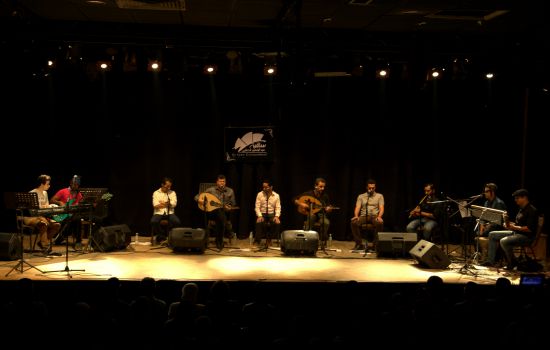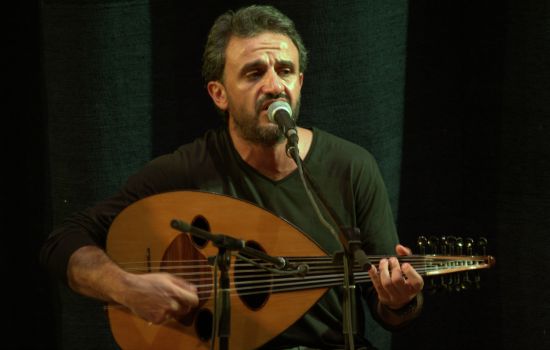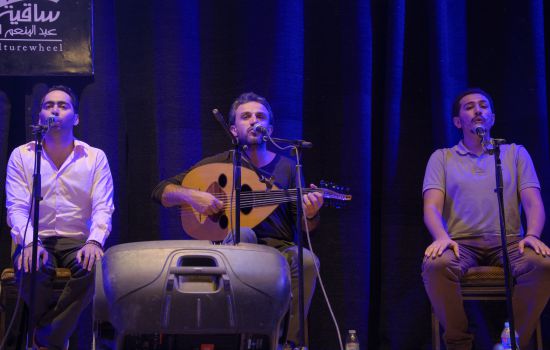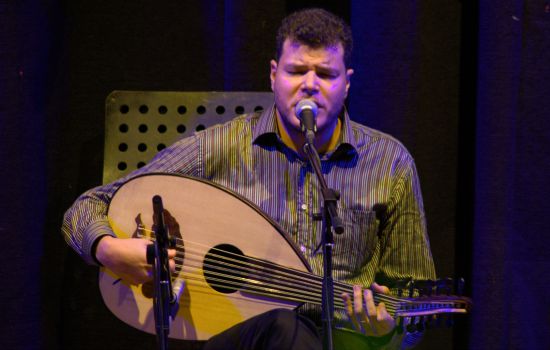“Egypt is the garden embracing all poets; her son is chivalrous, and lighthearted,” sang the prominent musician Hazem Shaheen during a night of poetry and music held at El-Sawy Culturewheel on 11 September.
Under the title Maana Egtimaana (The Essence of our Encounter), the night was indeed a coming together of poets and musicians whose different repertoires are inundated with Egyptianness.
Prominent oud players, music composers and singers Hazem Shaheen and Shady Moenes joined forces with three famed poets — Ahmed Haddad, Mostafa Ibrahim and Michael Adel — to present a night where both the spoken word and authentic melodies amalgamated to speak of life, love, and politics.
The night opened with a musical composition of Shaheen’s and was followed by a total of 14 songs; each either composed by Shaheen or Moenes, and written by one of the three poets. Besides being the programme’s composers, Shaheen and Moenes also sang and played oud, and were accompanied by musicians on the piano, bass, percussion and nay.
The night also witnessed solo poetry interludes delivered by the three poets, between each musical piece.
The starting point was with songs discoursing about worldly grievances; from the temporary encounters between humans, their infatuation with goodbyes, to the state of nostalgia that ensues as a result, and which at times blurs the boundary between life and death.
The audience saw how those gulps of grief are experienced in the midst of a "normal life" in Ibrahim’s Al-Mawt Biyishbeh Al-Hayyah.

Maana Egtimaana (The essence of our encounter) took place at El-Sawy Culture Wheel on 11 September. (Photo: Sara M Shady)
Soon enough, the tinge of sadness gave in to traces of joviality with Haddad’s Kaman W Kaman — a vivid tableau of love scenes, sung into life, where the lover whispers words of love to his beloved, as they enjoy the gentle sea breeze during sunset.
The inherent gloominess of existence swiftly made a come back with Adel’s Bedoun Inzar in which he presented a manifesto to accommodate life’s abrupt changes. Next, Haddad shared his aspirations for a short sigh, and lots of warmth, happiness, forgetfulness and even death, in Neaneaa Fi Kobbayet Shay.
A supplication by Ibrahim followed in Ya Rab, before the audience was granted other romance intermissions, including Adel’s Awel Miaad. From there, the audience was taken to the street, to the people’s grievances against the backdrop of a corrupt global capitalist system, persistent authoritarianism, and cruel poverty with Haddad’s Eini Fi Einik and Adel’s Ya Asheqeen Wagh El-Gamal El-Hor.
It was Haddad’s Safha Gedida, in its overwhelming tenacity to mold a new tomorrow for Egypt, that smoothly canopied the night.
Speaking to Shady Moenes, he said the first thought of this collaboration came three months ago.
“I noticed that different bands were getting together and collaborating in concerts,” Moenes told Ahram Online.
“I wanted to do the same, except by presenting something very Egyptian and which can authentically depict our Egyptian identity. No one other than Shaheen, Haddad, Ibrahim and Adel, who are all dear friends, could have done it better,” he added.

Musician Shady Moenes performing at El-Sawy Culture Wheel on 11 September. (Photo: Sara M Shady)
This emphasis on Egyptian heritage is a main element of Moenes’s own repertoire, as a co-founder of Eskendrella, but also as the leading member of Hekayat band, which he founded in 2009, with the aim of reintroducing heritage with a hint of contemporariness, by focusing on the repertories of the late icons of Egyptian poetry and music, El-Sheikh Imam and Sayyed Darwish.
As Haddad puts it, “These collaborations are currently taking place across the art scene, and especially in poetry, cinema, music, etc. It's good to see independent artists come together every now and then.”
As an award-winning Egyptian poet, filmmaker and actor, Haddad’s repertoire is adorned with poetry nights in which he collaborated with musicians like Shaheen, Moenes, and others. Maana Egtimaana, however, was his first collaboration with fellow poets.
“Ibrahim, Adel and I belong to the same generation more or less, and hence are not so different in terms of our thinking. So it was easy to collaborate,” Haddad explains.
With much zeal, the five artists proceeded to hold weekly brainstorming sessions, during which they discussed the project’s particularities, and specifically the need for common themes to underpin the night’s programme.
“We focused on the human side of things,” award winning oud player, composer and singer Hazem Shaheen, who is also Eskendrella band’s co-founder and its leading member, explains. “We also integrated our own artistic philosophy, and the message we have behind it.”

From left to right: poet Ahmed Haddad, musician Shady Moenes and poet Michael Adel. (Photo: Sara M Shady)
A text selection process followed whereby each poet contributed poems that fit with these general themes. Next, Haddad proceeded to design the night’s programme.
“I tried to create a link between all the texts and to see how they can be divided and ordered. At first, we chose the texts that were discoursing about life and death, and from there we went into love texts, and different scenes before resorting to political texts that subtly speak back, and to the street,” Haddad explains.
While some of the programme’s songs had already been composed by either Shaheen or Moenes before, some compositions made their debut that night. Shaheen had worked with Haddad before, but was yet to collaborate with both Adel and Ibrahim. As for Moenes, he had collaborated with all three poets before, but also composed two new pieces: Awel Maaad for Adel, and which was only performed once before, and Ya Rab for Ibrahim, which made its debut that night.
“Once the poets submitted their texts, Shaheen and I began working together on the music for the missing pieces. Then we began brainstorming what instruments can serve us right and went for the piano, base, percussion and ney,” Moenes said.
For his part, renowned pianist and accompanist Ahmed El-Mougy began to adapt piano and bass guitar to the new music, which he finalised within a relatively short period of time.
“It wasn’t as hard as it was beautiful,” El-Mougy comments. “Each of the participating artists has his own audience. So to bring them all together means that each artist’s audience will become familiar with the others’ repertoires,” he added.

Oud player, musician and singer Hazem Shaheen. (Photo: Sara M Shady)
As for the poetry interludes, Shaheen explains that these were necessary because “we didn’t want to over do either the music or the poetry, for the audience not to get bored.”
During the interludes, Haddad, Ibrahim or Adel delivered excerpts from their poetry. Haddad, for example, delivered Mandeel Dr Fawzi, Gazma Fi Mashyitha Sultana (both published in his collection of poems Dolab El Hedoum, 2008), as well as Iktimal El-Amar and El-Hegra, which were only published on Facebook, besides other texts.
The harmony that characterised the night’s performance echoes its title: Maana Egtimaana, a two-word sentence taken from the repertoire of the late Egyptian colloquial poet Fouad Haddad that can be translated into “The essence of our getting together.”
“The meaning of our get together is that we’re presenting authentic Egyptian art, so that if you happen to be a foreigner and aren’t familiar with the language, you can tell that the music is Egyptian the moment you hear it,” Moenes asserts.
“I think it’s a good idea to come together every now and then. It has a different and unique taste when each of us gets swamped into our own work for some time, then come to reunite,” Haddad concluded.
For more arts and culture news and updates, follow Ahram Online Arts and Culture on Twitter at @AhramOnlineArts and on Facebook at Ahram Online: Arts & Culture
Short link: